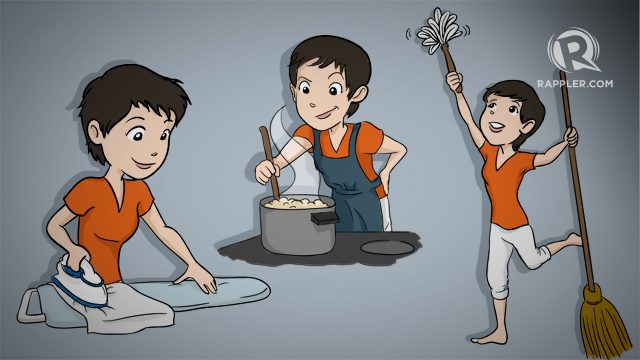SUMMARY
This is AI generated summarization, which may have errors. For context, always refer to the full article.

Is the cheap labor of our local economy the way that it should be? And if the Philippine economy could one day pay fair wages to our household help, would you be willing to cook, clean, and do your own laundry?
Like most of my peers in Manila, I grew up with household staff. I was raised by a yaya, clothed by a labandera, and fed by a kusinera. With labor being relatively cheap in the Philippines, it wasn’t so unusual that even a middle class child would reach adulthood without being familiar with the kitchen or even touching laundry soap.
I left home for college at fifteen and haven’t been comfortable having helpers since, moving into my own place right out of school. I cringe a bit when I visit friends and family and they say, “Inday, pakuha naman ng tubig (Inday, please get me some water),” but I guess it’s been too long that I’ve been getting my water myself. I become uneasy asking for help even though it’s expected, and helpers become uneasy around me for not wanting their assistance, thinking me overprotective of my belongings, or not wanting them to touch my food.
When I first moved to the US, my father said to me, “You can work as hard as you want and be as rich as you can get in America, but in the end you’ll still be poor. You’ll still be cooking your own food and washing your own clothes.”
I thought, “What was wrong with that?” Wasn’t I going to eat the food I cooked and wear the clothes I washed? Did my success mean less if there wasn’t anyone beneath me, doing the chores I was “too successful” to be doing? Did it make my perseverance meaningless if I couldn’t put my feet up on my desk and order people around?
More importantly – was I being foolish because I actually enjoyed doing the work? I loved not having an extra person in my home to do my personal tasks. I didn’t even want a housekeeper’s subtle presence that manifested itself in things moved out of their places upon my return. I enjoyed the reward if getting things from a state of dust and disorder to a state of clean. I quickly got used to the laundry chore and loved it, especially the fact that garments didn’t rip, go missing, or turn pink or blue outside my watch.
The cost of labor
Labor is expensive in any developed nation, so unless you’re wealthy or truly domestically challenged, hiring help is not something that’s typical in the average household (with the exception of childcare, which is quite common if both parents work). Sometimes I hear Americans say that their dream is to move someplace where they can have servants.
This makes me wonder – is it really so bad to clean up one’s own mess? Is one’s time too precious that it’s more economical to pay someone less money than what you could earn during that time? What would we actually do with the time not spent on chores?
Or maybe I only feel this way because I grew up with help, and being without it has been a choice I made as soon as I could, owing to the fact that I actually had decent cooking and cleaning skills.

I credit the high cost of domestic help for allowing me the necessity of doing my own cooking (or otherwise eat salty, fatty, or costly restaurant food). Wanting to replicate homeland favorites, I took over the kitchen and came up with dishes that only needed me to close my eyes to convince me I was back home. I could cook as little or as much as I wanted, and if I made the dish too bland or overcooked it, it was my own fault and not some poor shrugging cooks’.
I took to task most of the household repairs and even minor renovations, using my honed carpentry and electrical skills to replace light fixtures, bathroom vanities, kitchen faucets and sinks. Over here there is no Manong to ask to paint walls or sweep floors for less than $100, and no Manang to iron shirts whose creases eluded the hot dryer. The cleaners will do that for about $4 per shirt, and even more for pants. On rare occasions I do pay that price, but I end up not wanting to “ruin” my expensively pressed shirt by wearing it.
Hiring household help means letting go
Sometimes my wife and I are tempted to hire a cleaning lady to take care of the weekly dusting, scrubbing, and vacuuming around the home. We check our numbers and even get close to rationalizing the going rate of $130 per cleaning. And then we ask each other, “What if she doesn’t clean like we do?” or “What if she uses the toilet rag for the kitchen counter?” and even something mundane like, “Well she definitely can’t be afraid of our dogs.”
Then I realize that having help requires one to let go of these concerns and micromanaging points, and simply trust that the assigned work will be completed as expected. Maybe the leisure time that one gains when someone else does one’s cleaning and cooking made up for that lack of control. Or maybe one just eventually lets go of those tasks and treats them as someone else’s responsibility, at a monetary cost.
The conflict of help
I am conflicted when I do go home and become surrounded by helpers who are eager to serve me. During a massage my friends and I once got, I became miserable thinking how the low massage tables probably hurt the masseuse’s back. I wondered how much they got to take home from the pricey cost of my massage. I wondered if their tired hands would be too weary to hold their kids at home.
And then I remembered that their tired hands would be better off holding cash than if they came home empty-handed without that job. The helpers needed their jobs of servitude to support their families back home. The cheap labor was part of the economy which also put kids through school – hopefully so they wouldn’t also have to be servants when they grow up.
I understand it, but still find it difficult to be part of it, thinking that there must be another way. So I try to fight it. I pay or tip generously, but I also worry about making someone dissatisfied with their regular wages. I still refuse the help if a glass of water I want is within my reach or if I’m familiar enough with a home’s kitchen or laundry machines. Staff members laugh at me for cringing when I am called “Ma’am,” and they refuse my request when I insist on being called by my first name.
“I can’t do that,” one of them finally said to me. “You’re the boss and I’m the employee. That’s just the way it is, and the way that it should be.”
What do you think? Is the cheap labor of our local economy the way that it should be? And if the Philippine economy could one day pay fair wages to our household help, would you be willing to cook, clean, and do your own laundry? Do you even know how?
Tell me your answers in the comments! Just a few things to ponder this Labor Day as we pay our respects to those who toil on our behalf. – Rappler.com
Shakira Andrea Sison is a Palanca Award-winning essayist. She currently works in finance and spends her non-working hours planning her chore schedule in subway trains. She is a veterinarian by education and was managing a retail corporation in Manila before relocating to New York in 2002. Her column appears on Thursdays. Follow her on Twitter: @shakirasison and on Facebook.com/sisonshakira.
Add a comment
How does this make you feel?
Loading
There are no comments yet. Add your comment to start the conversation.